|
1.
CENTRAL AND WEST AFRICA
Operational delays and transport problems
continue
The timber industries in Central and West African
countries are facing several challenges with adverse
weather conditions and operational difficulties affecting
production and trade. Unprecedented rainfall has been
observed across the region causing production delays and
transport problems as many areas have experienced
flooding.
The impact of weather related issues extend from Douala
in Cameroon to Libreville and Port Gentil in Gabon and
even Pointe Noire in Congo Brazzaville. Landslides,
damaged railways and logistical disruptions have become
prevalent due to the continuous heavy rain.
Operational challenges are widespread affecting the
supply of logs and hindering the movement of fuel and
food to remote areas especially in Cameroon and Gabon.
Road and rail repair and maintenance are a constant
challenge.
Producers report demand for wood products remains
subdued and this is reflected in stable prices. The slower
demand at present has means mills can adjust output to
adapt to disrupted harvesting and transport problems.
Suspected illegal trafficking of Kevazingo
Recent developments in Gabon have highlight the issue of
illegal trafficking in Kevazingo. News is circulating in
trade circles that Kevazingo logs and sawnwood were
discovered in containers ready for dispatch.
Also in Gabon, the government has expressed the intention
to have Gabonese workers constitute 90% of the timber
sector workforce with 10% being expatriates. However,
implementing this has meant some mills are short of
workers and middle management staff which has slowed
operations especially in the veneer peeling mills. It is
understood the government has formed a working group to
prepare suggestions on implementation.
Increasing capacity in professional oerganisations
The ATIBT has reported that, beginning in the last quarter
of 2023, the professional organisations Artisan au Féminin
and ATBO in Cameroon, CMA, Cluster bois and AMC in
Congo, FGBSP, Dynamique bois and the PO members of
the Chambre Nationale des Métiers de l'Artisanat du
Gabon (CNMAG) in Gabon, COPEMECO and ACEFA in
the DRC will benefit from capacity building on the
operation of an association and on strategies for accessing
public contracts or projects.
This effort is being undertaken by the Cameroon
Federation of Promoters of Secondary and Tertiary wood
processing (FECAPROBOIS) in response to the needs
expressed by industry players.
See:
https://www.atibt.org/en/news/13414/with-adefac-8-professional-organizations-in-the-forestry-and-timber-industry-strengthen-their-organizational-capacities
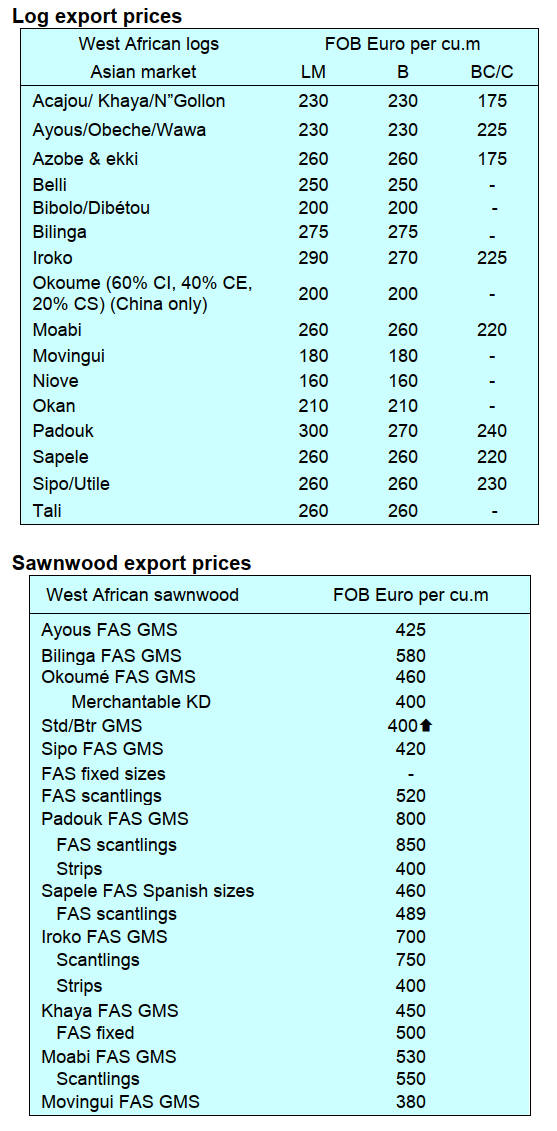
Through the eyes of industry
The latest GTI report lists the challenges identified by the private
sector in the Republic of Congo and Gabon.
https://www.itto-ggsc.org/static/upload/file/20231121/1700552181514582.pdf
2.
GHANA
Marginal growth in exports to Europe
According to the Timber Industry Development Division
(TIDD) third quarter 2023 wood export report there were
one hundred and fifty one (151) exporters during that
period. The total export volume for the period was 68,695
cu.m, compared to 101,882 cu.m for the same period in
2022.
Exports were of air and kiln-dried sawnwood (73%),
plywood for all markets (12.5%), veneers (5%), billets
(4%), and teak logs (2%), the balance was other wood
products.
Of Ghana’s market destinations Asia, Europe and Africa
accounted for more than 90% of the total export volumes
in both 2022 and 2023. North America and Middle East
markets accounted for less than 10% of Ghana’s total
export volumes.
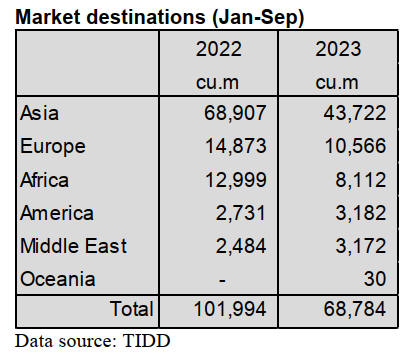
The table above shows that, of the three main market
blocks only Europe recorded a marginal increase. In
contrast, the 2023 trade with Asian and African markets
declined year on year. Ghana’s exports to the Asia earned
Eur17.03 million (56%) from 43,722 cu.m. (64%) of wood
products exports during the third quarter of 2023
compared to the 2022 figures of Eur27.78 million (61%)
and 68,907 cu.m (68%) considerable declines. India was
the primary destination (in terms of value) for Ghana’s
wood products.
For exports to Europe total receipts were Eur6.13 million
from a volume of 10,566 cu.m during the third quarter of
2023. The figures indicated decreases of 35% and 29% in
value and volume respectively as compared to Eur9.43
million (21%) obtained from the volume of 14,873cu.m
(15%) recorded in the third quarter of 2022.
The data also showed exports of wood products to
European markets included products such as air and kiln
dried sawnwood, plywood, billets, rotary veneers,
mouldings, sliced veneer, teak logs, briquettes and
kindling.
Wood products exported to Africa were air and kiln dried
sawnwood, plywood, rotary veneer, mouldings and
veneers. These were valued at Eur3.12 million from a total
volume of 8,112 cu.m during the third quarter of 2023.
These figures showed decreases of 33% and 38% in value
and volume respectively when compared to the Eur4.68
million from a volume of 12,999 cu.m recorded in 2022.
Egypt, South Africa, Morocco, Tunisia, Algeria and
Mauritius were the main destinations for these wood
products.
For the period under review a total of ten ECOWAS
(Economic Community of West African States) countries
within the sub-region accounted for an export volume of
6,959 cu.m valued at Eur2.49 million out of the total
African wood products in 2023 against 12,237 cu.m
(Eur4.23 million) recorded in the same period last year.
This translates to an overall higher average unit price of
Eur357/cu.m for the period in 2023 compared to
Eur346/cu/m in 2022.
Objections raised over proposed mining in forest
reserves
Some Civil Society Organizations (CSOs) have been
alarmed by the plans prepared by a new mining company,
High Street Ghana Limited, to mine in one of Ghana’s
Recreational Forest Reserves, the Kakum Park. This
comes after there were reports suggesting the mining
company took over of some parts of the Kakum National
Park for mining.
The public have expressed outrage over how part of the
country’s forest reserves were allocated for mining. This
prompted stakeholder organisations in the forestry and
environmental fields to call for an immediate review of the
Legislative Instrument (L.I 2462) on Environmental
Protection (Mining in Forest Reserves.
During a stakeholder engagement on the new Regulation
on Mining in Ghana’s Forest Reserves (LI 2462) 2022 the
Director of Nature and Development Foundation
cautioned against the potential widespread destruction of
the country's forests if the Legislative Instrument (LI
2462) is not revoked.
According to a stakeholder analysis of L.I. 2462, the new
regulations on mining in the forest resetrves had no
legislative foundation and were not consistent with the
country's environmental policies. In response the Chief
Executive Officer (CEO) for the Minerals Commission,
Martin K. Ayisi, said there is currently no law in Ghana
that bans mining in forests.
However, the media report the Minerals Commission has
rejected the application from High Street Ghana Limited
for a mining license within the Kakum National Park.
The Ghana Institute of Architects (GIA), which also
expressed great concern about the attempt to mine within
the Kakum National Park, has commended the
Commission in refusing the permit.
See:
https://thebftonline.com/2023/11/13/cso-coalition-kicks-against-mining-in-forest-reserves/
and
See:https://www.myjoyonline.com/high-streets-application-to-mine-in-kakum-park-was-rejected-minerals-commission/
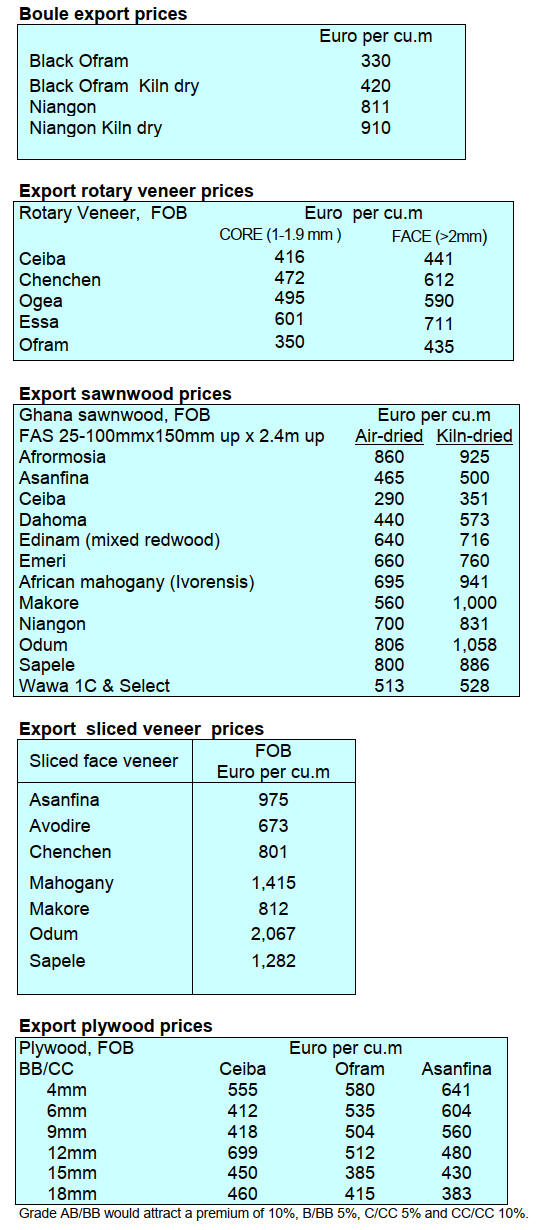
3. MALAYSIA
Effectiveness of certification
policing questioned
A recent report claims there are weaknesses in the
Malaysian Timber Certification Scheme (MTCS) which,
the report says, casts doubt on the effectiveness of the
Malaysian Timber Certification Council (MTCC) and the
PEFC in guaranteeing standards and enforcing
compliance.
It is claimed in the report that SIRIM, the accrediting and
auditing body, does not have a clear limit on how many
issues of non-compliance lead to suspension or revocation
of certificates.
The Report says “We know that the government of
Sarawak is making real and concerted efforts to protect
their forests. But the way that MTCS is currently
functioning simply cannot guarantee any of the standards
they claim to uphold, says the report. The system needs to
be reformed.” The report lays out 15 key
recommendations for improving the system with a focus
on reforming the grievance procedures.
See:
https://www.bmf.ch/en/news/lost-in-certification-new-report-exposes-greenwashing-in-malaysian-timber-industry-241
and
Read more:
https://www.nst.com.my/news/nation/2023/11/978474/groups-cite-violations-forest-certification-standards-call-review-timber
Auditor-General’s report highlights forest management
issues
According to the 2022 Auditor-General’s Report the
country’s forestry sector contributed RM6.601 billion to
GDP or 0.4% of GDP and exports by the timber industry
contributed a total of RM22.744 billion in 2021.
The report says “Overall, based on the scope of the audit,
forest management in Malaysia has been done sustainably
to provide socio-economic benefits and maintain
environmental sustainability. However, based on audit
samples reviewed in nine states there were cases where the
weakness in forest management in development of forest
plantations, logging, mining and quarry activities within
the Permanent Forest Reserve (HSK) had “posed a
negative impact on the environment.”
To ensure that the objective of Sustainable Forest
Management is achieved the report recommends that the
Ministry of Natural Resources, Environment and Climate
Change (NRECC), the Forestry Department of Peninsular
Malaysia and the Forest Departments in Sarawak and
Sabah create a database on the area of the permanent
forest reserve, protected areas and forest land.
See:
https://www.thestar.com.my/news/nation/2023/11/22/public-can-monitor-issues-highlighted-in-a-g039s-report-via-digital-dashboard
and
https://www.malaymail.com/news/money/2023/11/22/a-gs-report-forestry-sector-contributes-rm6601b-to-malaysias-gdp/103533
Sarawak enacts climate change law
The Sarawak State Legislative Assembly passed the
Environment (Reduction of Greenhouse Gases Emission)
Bill making Sarawak the first state in the country to have
legislation to address climate change. The Bill aim to
safeguard Sarawak's environment by implementing
strategies to reduce greenhouse gas emissions and achieve
net zero carbon emissions in the State by 2050.
While Malaysia had committed to reduce greenhouse gas
emissions by 45% by 2030 and achieve carbon neutrality
by 2050 in accordance with the Paris Agreement, the
country’s Parliament has not yet adopted legislation to
achieve these obligations.
The measures provided in the Bill in Sarawak include
requiring registered businesses in scheduled economic
sectors to submit annual carbon emission reports and the
setting carbon emission thresholds. Where any registered
business entity is unable or unwilling to bring their carbon
emissions down to the emission threshold levels, a carbon
levy at a rate to be determined by the State Cabinet will be
imposed.
The Bill provides for a robust system for verification and
validation by appointed carbon standard administrators to
ensure integrity and credibility for carbon credits issued in
Sarawak.
See:
https://www.thestar.com.my/news/nation/2023/11/20/sarawak-first-in-the-country-to-enact-anti-climate-change-law
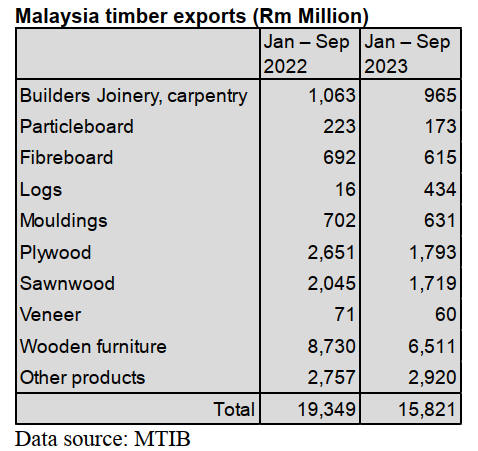
Through the eyes of industry
The latest GTI report lists the challenges identified by the private
sector in Malaysia
https://www.itto-ggsc.org/static/upload/file/20231121/1700552181514582.pdf
4.
INDONESIA
Knock-down furniture
exports to Europe decline
Sapto Daryono, the Chairman of the Regional Committee
for the Indonesian Furniture and Crafts Industry
Association (Asmindo) said that knock-down furniture
exports are still experiencing a decline as global demand
falters. The Association had pinned hopes on the domestic
market especially as the government encouraged furniture
entrepreneurs to produce E-Catalogues.
However, the domestic market is increasingly difficult to
penetrate because it is flooded with imported products
which are offered at very affordable prices. He added,
“people tend to choose cheaper products even though the
quality of Asmindo products is higher and the products are
unique.
He said he hopes locally made products will be given a
chance so that imported goods do not dominate the local
market.
In related news, according to ACE Director, Teresa
Wibowo, the furniture market in Indonesia is predicted to
grow further in the future and this will be good for
Indonesian furniture businesses. Moreover, the Indonesian
economy is growing and this will have a positive impact
on the potential for development of the domestic furniture
market.
"I continue to think positively about the future
development of the Indonesian furniture business because
many foreign investors are arriving to secure business.
This year could be the revival of the national furniture
industry, said Teresa, as the government is supporting
several international exhibitions which could boost trade.”
See:
https://jogja.tribunnews.com/2023/11/16/ekspor-furniture-diy-ke-eropa-turun-kerajinan-masih-bisa-bertahan
and
https://economy.okezone.com/read/2023/11/07/455/2916069/potensi-besar-bisnis-furniture-di-indonesia?page=2
Furniture design competition, support for a
sustainable furniture industry
The furniture industry is a very strategic sector for
Indonesia’s economic development. There are several
criteria that make furniture making a strategic sector and
these are because it is an added value sector and
Indonesian furniture is globally competitive. An advantage
is that Indonesia has abundant natural raw materials and it
also has manufacturing and design skills.
To further increase interest in sustainable furniture among
the Indonesian people a programme entitled "Indonesian
Sustainable Furniture Design Competition" (ISFDC) will
be held.
Hartono Prabowo, Technical Director of FSC Indonesia
said the ISFDC is an excellent opportunity for professional
designers to be able to increase their role in forest
sustainability by creating furniture designs that use
materials from sustainable sources so that forest managers,
including forest farmers in remote villages can benefit.
See:
https://wartaekonomi.co.id/read518853/indonesian-sustainable-furniture-design-competition-dukungan-untuk-industri-furniture-berkelanjutan
The Indonesian forestry paradigm
The Ministry of Environment and Forestry has invited
academics and the Dean of the Faculty of Forestry, Gadjah
Mada, University (UGM) to offer inputs regarding the re-
orientation of Indonesia's sustainable forestry development
paradigm. The Minister of Environment and Forestry, Siti
Nurbaya, said it was important to formulate a re-
orientation of sustainable forestry development and this
discussion could be important for future forest
management, including strengthening the National Level
Forestry Plan (RKTN).
Minister Siti conveyed some notes for particpants:
First, on a green manufacturing orientation, Minister Siti
said this was something important and this would be the
basis for the Ministry. For example, when talking about
social forests there is already a Presidential Regulation on
Integrated Area Development based on social forests. The
government has positioned National Parks as the center or
source of regional economic growth. National Parks can
also provide examples for appropriate income distribution.
Second, it is necessary to develop a centre of excellence.
This is intended for forest landscape management. As a
start, The Minister encouraged UGM's Special Purpose
Forest Area (KHDTK) to become a centre of excellence in
Java. She added, "because we have different landscapes,
centres of excellence need to be developed in other
locations such as Kalimantan and Sumatra”.
Third, Minister Siti said that forest management in
Indonesia could be an evolutionary development with
forests and other land uses at the centre.
See:
https://www.medcom.id/pendidikan/news-pendidikan/4KZMX9wk-klhk-minta-masukan-20-guru-besar-ugm-soal-paradigma-kehutanan-indonesia
and
https://www.tribunnews.com/nasional/2023/11/14/menteri-lhk-tekankan-pentingnya-reorientasi-paradigma-pembangunan-kehutanan-indonesia-berkelanjutan.
and
https://www.msn.com/id-id/berita/nasional/klhk-bahas-pembangunan-kehutanan-indonesia-bersama-20-guru-besar-ugm/ar-AA1jV6LK
Carbon trading scheme for forestry sector
Indonesia has launched a carbon trading scheme to boost
GHG emissions absorption in the forestry and other land
use sectors to reach carbon dioxide reduction targets by
2030.
The Chairman of the Indonesian Association of Forest
Concessionaires (APHI), Indroyono Soesilo, in a press
release, stated that half of the companies holding Forest
Utilisation Licenses (PBPH) have been included in the
carbon trading scheme, adding there are 600 PBPH
holders that have been included.
According to Indroyono, PBPH holders must meet several
requirements to enter the carbon credit scheme including
drafting a Mitigation Action Plan Document before being
included in the National Registration System. Emissions
Reduction Certificate (SPN) will be released after a
verification and monitoring processes.
See:
https://en.tempo.co/read/1795204/indonesia-releases-carbon-trading-scheme-for-the-forestry-sector
Entrepreneurs encouraged to adopt multi-business
forestry
The Ministry of Environment and Forestry is encouraging
companies receiving Forest Utilisation Business Permits
(PBPH) to implement Multi-business Forestry plans to
support Indonesia's FOLU Net Sink 2030 which is in line
with achieving the Global Development Goals.
The Director General of Sustainable Production Forest
Management in the Ministry, Agus Justianto, explained
that corrective steps are needed to strengthen strategic
policies to stimulate the forestry sector, especially in the
upstream sector and in addressing climate change. This
includes providing support to businesses to implement
Multi-Business Forestry.
A change in the forest management paradigm through
Multi-business Forestry is expected to encourage the
development of various multifunctional forest
management models so that the spectrum of types and
business options that are implemented become wider.
For the implementation of Multi-business Forestry
companies need to apply an appropriate management
regime according to local conditions including
environmental carrying capacity, land suitability, agro-
climate and socio-economic institutions. He emphasised
that Multi-business Forestry needs to be interpreted not
just as an exploitative business model but must be able to
accommodate a variety of local, regional, national and
even international interests.
See:
https://forestinsights.id/pengusaha-hutan-didorong-implementasikan-multi-usaha-kehutanan/
Improving the human resources for the furniture and
crafts industry
The Indonesian Furniture and Crafts Industry Association
(Himki) stated that they are committed to improving
human resources in the national furniture and crafts
industry.
The Chairman of Himki, Abdul Sobur, stated that human
resources are an important factor in the furniture and crafts
industry and play a central role in determining product
value. However, Abdul Sobur admitted that some
companies still have difficulty finding experienced and
certified workers with skills. He added, the furniture and
crafts industry is currently experiencing high competition
with other industrial sectors for labour.
The Himki held a meeting with the Head of the Industrial
Human Resources Development Agency, Ministry of
Industry and conveyed some suggestions including the
need to increase the budget for student scholarships at the
Furniture and Wood Processing Industry Polytechnic
(Polifurnika) as well as providing student scholarships at
universities that have majors supporting the furniture and
craft industry.
It is necessary to develop Vocational High Schools and
universities related to the furniture and craft industry to
achieve a link and match with the industry, he said. Also
establishing integrated training centres would help
upgrade the quality of human resources.
See:
https://www.antaranews.com/berita/3823803/himki-berkomitmen-tingkatkan-kualitas-sdm-industri-mebel-dan-kerajinan
National economy continuing to grow amid global
uncertainty
The Indonesian economy is continuing to grow positively
despite global uncertainty according to economist and
Research Director at the Center of Reform on Economics
(CORE) Indonesia, Piter Abdullah. He said this was
evident by positive growth in 2022 and this year.
2023 presented risks to the economy but “we have been
able to survive and continue to grow positively" he told
the media, because Indonesia's economic fundamentals
remained solid.
The characteristics of the Indonesian economy, which
relies mostly on domestic demand, provides scope for
continued positive growth, he argued. Statistics Indonesia
reported tha, in the third quarter of 2023, the national
economy grew by 4.94% year on year. The figure reflected
a slight slowdown compared to the previous quarter's
growth of 5.17%.
See:
https://en.antaranews.com/news/298848/national-economy-continuing-to-grow-amid-global-uncertainty-expert
Through the eyes of industry
The latest GTI report lists the challenges identified by the private
sector in Indonesia
https://www.itto-ggsc.org/static/upload/file/20231121/1700552181514582.pdf
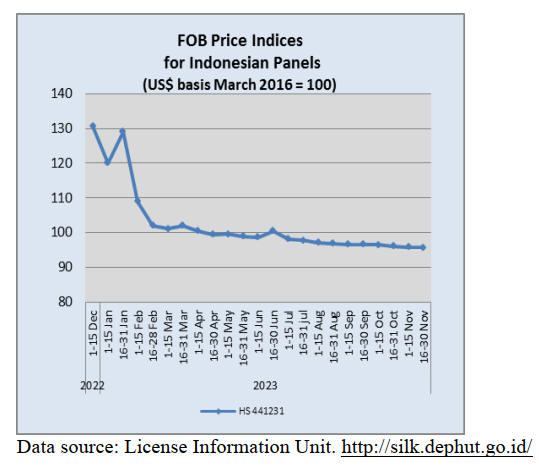
BMRC Webinar ‘Incentivising Good Tropical Forest
Governance’
Dr. Krisdianto Sugiyanto, Honorary Chair of the Broader
Market Recognition Coalition (BMRC) Interim
Secretariat, delivered opening remarks at a BMRC
Webinar ‘Incentivising Good Tropical Forest Governance’
the text of which is provided below.
“The BMRC is a platform to endorse, monitor and
promote implementation of national sustainable forestry
systems and to label and promote trade of forest products
that originated from BMRC-endorsed national systems.
The BMRC will also promote internationally harmonised
standards for legal and sustainable forest products in trade
regulations and public and private sector procurement that
give recognition to BMRC labelled products.
Development of the BMRC was initiated since
deliberations and discussions in the Indonesian Pavilion
during COP 26 and several global fora on forest policy on
the need to provide incentives for good forest governance
through broader market recognition beyond FLEGT VPA
upon qualifying national verification systems.
Producer countries have been developing robust national
systems on timber legality assurance system and call for
wider recognition by markets beyond the FLEGT VPA
partners. In a Policy Forum on Broader Market
Recognition in London in September 2022, multi-
stakeholders of 6 (six) countries (Indonesia, Ghana,
Liberia, Guyana, Cameroon, and the Republic of Congo)
agreed to collaborate towards formalisation of a coalition
to work towards broader market recognition on national
verification systems beyond FLEGT VPA processes. The
Forum also drafted a joint statement that subsequently was
finalised and signed in the margin of COP 27.
Subsequently, in a meeting in Bali in February/March
2023, the coalition countries agreed to entitle the coalition
as Broader Market Recognition Coalition (BMRC) and
developed a draft of roadmap and action plan to secure
broader market recognition of national sustainable forestry
systems.
An interim secretariat of BMRC was also established to
facilitate the works of the coalition towards the intended
missions.
The Coalition has also developed its logo and website as a
platform to disseminate BMRC visions and missions and
to accommodate query and inputs and to share and discuss
how to reward good governance with recognition and
strong market incentives upon BMRC forest products.
As stipulated in the roadmap, the Coalition will further
develop institutional arrangement and mechanism for
recognition of endorsement of national systems, on-
product labelling and promotion of BMRC forest products.
Further the coalition will also work towards development
of partnership and mutual collaboration towards
achievement to provide market incentives upon the
national systems as outlined in the joint statements and the
roadmap.
The founding countries of BMRC invite other timber-
producer countries to join the initiative to foster a broader
market recognition of national systems, as well as
participation of non-tropical countries. Both producer and
consumer countries will mutually be benefiting from such
collaboration.
We believe that collectively the BMRC is a
strategic
measure to drive stronger transformation and a platform to
supports efforts to combat illegal logging and associated
trade, to promote implementation of sustainable forest
management, and to contribute to the global ambition in
addressing climate challenges.
In addition to efforts to introduce BMRC in global setting,
the BMRC Interim Secretariat and coalition members have
carried out outreach and sharing information to respective
stakeholders upon the establishment of the Coalition,
including in meetings of the Asia Pacific Forestry
Committee (APFC) 2023 in Sydney, the 59th International
Tropical Timber Council (ITTC) in Pattaya Thailand, and
the Global Legal & Sustainable Timber Forum (GLSTF)
2023 in Macau China. This was to provide information
regarding the existence, mission, and objectives of this
coalition.
Further, the Interim Secretariat of BMRC invites
participation of stakeholders to BMRC sessions in the
Pavilion of Indonesia and COMIFAC in COP 28 Dubai to
share vision, roadmap and recent development of BMRC
and the future works and activities to be carried out by the
coalition. We believe that wider participation of stake-
holders form both producer and consumer countries will
help to strengthen the platform and to expand its positive
impact to support achievement towards transformations to
a better global forest management.”
See: https://forestgovernance.org/
5.
MYANMAR
Emerging role of NTFP and plantation timber
The Myanmar Wood-Based Furniture Association
(MWBFA) has taken another step in its business
promotion efforts with a visit to Union Minister of Natural
Resources and Environmental Conservation (MONREC)
to discuss the opportunities from utilising non-timber
forest products and plantation species other than teak.
Early this month the MWBFA sponsored the Myanmar
Furniture Exhibition (TTM Report Volume 27 Number
21). According to local news outlets the Association
members showcased furniture made from non-timber
forest products such as rattan, bamboo and from fast
growing plantations species such as Acacia.
Because of sanctions on the Myanma Timber Enterprise
(MTE) opportunities for wood product exports are
impacted. The MTE is the State institution which is solely
authorised to extract timber from the natural forest.
Commentators in Myanmar are of the opinion that timber
from the private plantations and non-timber forest
products (NTFP) could be exempted from sanctions since
there is no direct or indirect involvement of the MTE.
Climate vulnerability in Myanmar
In a press release the UN warned that the ongoing conflict
in Myanmar has not only caused a human tragedy but is
also an environmental catastrophe. The press release
continues “It is imperative that world leaders help end the
crisis in Myanmar by supporting communities to mitigate
climate impacts.
Increasingly isolated from the global economy and
strapped for cash, the military junta has accelerated the
exploitation of Myanmar’s natural resources, including
timber, jade and rare earth minerals to fund its human
rights abuses. The press release adds “growing resource
extraction, often unregulated and facilitated by the military
or other armed groups, is degrading the environment,
polluting water sources, ravaging forests and exacerbating
climate change risks. Myanmar is ill-prepared to deal with
the fast-approaching effects of climate change.”
See -
https://www.ohchr.org/en/press-releases/2023/11/military-coup-has-exacerbated-already-severe-climate-risks-myanmar-un
Disruption of border trade at more locations
The domestic media has reported recent armed clashes
have had a severe impact on the border trade and
businesses are suffering huge losses after the main China
border trade zone was closed after an alliance of three
ethnic groups launched offensives and took control of all
major routes to the border trading towns of Muse, Chin
Shwe Haw, Laukkai and Hseni.
The Muse border accounts for about 70% of Myanmar’s
cross-border trade with China and with it closed an
estimated US$400,000 in daily tax revenue has been lost.
The media report the estimated tax revenue in the first six
months of this year at US$77 million.
During the first five months of the 2023-2024 fiscal
year
trade between Myanmar and China exceeded US$3,832
million. China imported over US$2,510 million worth of
goods according to the Ministry of Economy and
Commerce.
See-
https://news-eleven.com/article/283189
and
https://www.irrawaddy.com/business/myanmar-china-trade-corridor-closed-as-battle-rages-in-northern-shan.html
6.
INDIA
No change in manufacturing
price index
The annual rate of inflation based on the all India
Wholesale Price Index (WPI) in October, was minus
0.52% in October compared to minus 0.26% recorded in
September 2023. The negative rate of inflation in October,
2023 was primarily due to fall in prices of chemicals and
chemical products, electricity, textiles, basic metals, food
products, paper and paper products as compared to the
corresponding month of previous year.
The index for manufacturing remained constant at 140.3 in
October2023 and September 2023. Out of the 22 NIC two-
digit groups for manufactured products, 13 groups
witnessed an increase in prices, 7 groups witnessed a
decrease in prices whereas 2 groups remained unchanged.
See:
https://eaindustry.nic.in/pdf_files/cmonthly.pdf
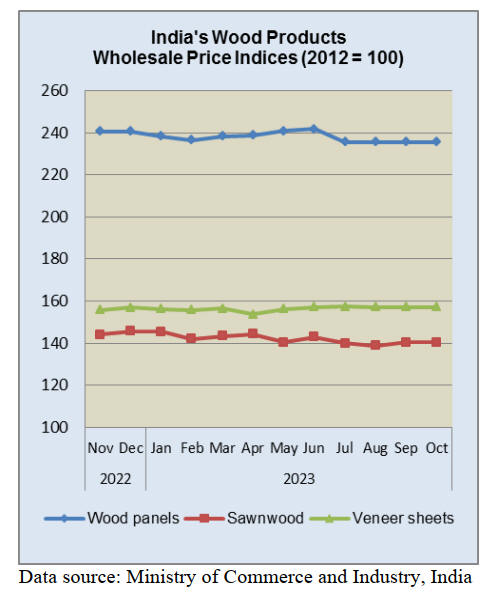
Mandatory Standards for for panels and furniture
The Bureau of Indian Standards (BIS) has issued
mandatory quality control orders for plywood, blockboard,
doors, MDF, particleboard, shuttering ply and a range of
other products and advised businesses to prepare and
secure BIS compatible. The order applies to domestic
producers and overseas suppliers.
The Order, called the Wood-Based Boards (Quality
Control) Order, 2023 will come into force six months from
the date of publication of the notification. The
Government order will apply tom overseas producers of
MDF and Plywood who export materials to India and
suppliers have been anxiously contacting importers.
The BIS order is mandatory for all companies and it is
understood that plywood manufacturers in India’s
unorganised sector will be given up to twelve months to
comply. The BIS order will apply to wood products
manufactured locally for export and the entry into force
will be 6 months for large companies, 9 months for
medium sized companies and 12 months for small and
micro industries.
Sources at the BIS confirm that overseas panel producers
have been approaching the BIS office to be certified but
for many there are questions such as “how to get BIS
certification and what are the costs for meeting the BIS
Standard”
Products affected
Panels
MDF is being imported to India from Vietnam, Malaysia,
and Thailand. Similarly, plywood is being imported from
Russia, Vietnam, Nepal, Indonesia, Malaysia and China
and others. Particleboard is being imported mainly from
Malaysia, Thailand, China and Vietnam.
After the notification of mandatory BIS for these products
the importers are insisting that overseas shippers obtain
the BIS standard.
The Indian particleboard industry has a very short of time
to secure the ISI Mark (a standards-compliance mark for
industrial products in India since 1950. The mark certifies
that a product conforms to an Indian standard) because the
deadline for them is 10 February 2024. According to the
BIS approximately 80% of particleboard and pre-lam
particleboard producers have not obtained an ISI mark
from the BIS.
BIS Officials confirm that the BIS Quality Control Order
is final and for the benefit of consumers and that the
industry should come forward and secure certification. It
has been reported that India has 90 pre-lam board
producers but as of October this year only 18 have ISI
certificates.
Furniture
The government also proposes bringing furniture under
BIS marks but this has been resisted by local
manufacturers and importers saying quality
standardisation will be very difficult to meet.
The Bureau of Indian Standard (BIS) wants beds, wooden
tables and chairs to be able to take a load of 110 kgs and
60 kgs respectively and meet stability, strength and
durability tests.
The industry says that the Quality Control Order (QCO),
which applies to imported and domestically produced beds
and chairs, is putting excessive burdens on them as the
Standards are tough to comply with.
The private sector and industry bodies have sought a
review of the Standards arguing that they should be
aligned with international standards. They also want a
phased implementation plan instead of rolling out the
Standards at one time. The government proposed bringing
wooden furniture under the Quality Control Order from
2025.
Plywood
It is understood that the main plywood manufacturing
companies have requested BIS to reconsider the quality
standards as for B Grade plywood/inferior quality
plywood there is no specific standards for which
certification from BIS can be secured. They argue that the
standards were made several years ago and needs to be
updated taking account of the reality in the market.
Also, there are over 1,000 small and micro manufacturers
(unorganised sector) which are producing plywood and for
them buying new machinery, laboratory equipment and
implementing quality control procedures will be expensive
and they asked for more time and a waiver on marking
fees.
MDF
Medium Density Fibreboard (MDF) is another industry in
India which is relatively young having been operating for
around 15-20 years and the sector is dominated by big
corporations and is well organised.
As of October 70-80% of MDF manufacturers were
certified companies hence BIS will hardly affect the
domestic MDF manufacturers. However, importers of
MDF will face some hurdles as the overseas suppliers will
require BIS certification.
Decorative plywood
Decorative Plywood is heavily dependent on imported
base panels coming from Malaysia, Indonesia and China.
As of November BIS Certifications have not been issued
to any overseas manufacturers/suppliers of plywood for
the manufacture of veneered decorative plywood.
Industry sources say it may take companies 3-6 months to
secure BIS certification and there is considerable concern
among manufacturers and importers.
The above was compiled from reports in the media, from
PlyReporter and from discussions with various industries
and importers.
See:
https://www.plyreporter.com/article/143714/imported-wood-panels-to-be-bis-marked-proposed
and
https://www.plyreporter.com/article/143759/overseas-panel-producers-seek-bis-standard-certification
Sandalwood plantation owners cheer
In what could help sandalwood plantation owners earn
more through exports the Convention on International
Trade in Endangered Species of Wild Fauna and Flora
(CITES) has removed India from its Review of Significant
Trade (RST) for Red Sanders Sandalwood.
The RST listing is the result of instances of species
smuggling. This decision was taken at the 77th meeting of
the Standing of CITES.
Red sanders (Pterocarpus santalinus) is a high value tree
endemic to few districts in Andhra Pradesh. The species
has been listed in Appendix II under CITES since 1994.
However, red sanders sourced from plantations comprise a
major part of the legal export.
https://www.business-standard.com/industry/agriculture/red-sanders-removed-from-cites-review-of-significant-trade-bhupendra-yadav-123111300597_1.html

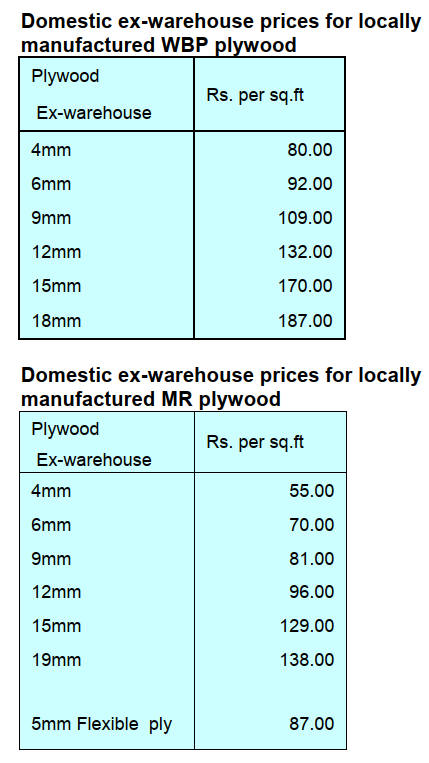
7.
VIETNAM
Wood and wood product (W&WP) trade highlights
W&WP exports to Canada in October 2023 were worth
US$19.8 million, up 22% compared to October 2022. In
the first 10 months of 2023 W&WP exports to Canada
reached US$62 million, down 22% over the same period
in 2022. The rate of decline has tended to narrow thanks to
consecutive increases in export turnover in recent months.
W&WP exports to the UK in October 2023 were valued at
US$18.7 million, up 25% compared to October 2022. This
is the second consecutive month that exports to the UK
increased year on year. This growth contributed to slowing
the gradual decline in exports in the first 10 months of
2023.
In October 2023 exports of kitchen furniture reached
US$112.7 million, up 23% compared to October 2022. In
the first 10 months of 2023 exports of kitchen furniture
reached US$947.1 million, down 16% over the same
period in 2022.
In October 2023 tali wood imported into Vietnam stood at
29,400 cu.m worth US$12.5 million, down 6% in volume
and 6% in value compared to September 2023. Compared
to October 2022, it decreased by 44% in volume and 41%
in value.
In the first 10 months of 2023 tali wood imports were
328,500 cu.m, worth US$137.5 million, down 26% in
volume and 24% in value over the same period in 2022.
Imports of raw wood (logs and sawnwood) from the US in
October 2023 increased again reaching 45,000 cu.m at a
value of US$18.5 million, up 6% in both volume and
value compared to September 2023.
The total volume of raw wood imported from the US in
the first 10 months of 2023 was 436,880 cu.m, worth
US$185.77 million, down 26% in volume and 34% in
value over the same period in 2022.
Wood and forest product exports
Vietnam earned US$11.65 billion from exporting wood
and forest products in the first ten months of this year, a
19% decline year-on-year according to the Vietnam
Timber and Forest Product Association. Export revenue
was US$1.28 billion in October, down 0.2% cent year-on-
year, of which wood and wood product exports earned
US$1.2 billion.
The decline in demand was put down to inflation and
tightened monetary policies in major wood product
markets and this has resulted in a decline in export
earnings since the beginning of the year, according to the
Association. However, many wood enterprises have begun
to receive more orders to satisfy year-end festive season
demand in global markets. The export of wood and forest
products for 2023 is estimated to reach US$15 billion
according to the Association.
Timbers from Laos and Cambodia - import ban
extended
Five years ago Vietnam’s Ministry of Industry and Trade
issued Circular No. 44/2018/TT-BCT regulating the
temporary suspension of import and re-export of round
wood and sawnwood from natural forests from Laos and
Cambodia. This Circular is effective until December 31,
2023.
After 5 years of implementation the Ministry of Industry
and Trade has conducted a review and assessment of the
implementation of Circular No. 44/2018/TT-BCT. Based
on the results of the summary and assessment and to avoid
legal gaps when Circular No. 44/2018/TT-BCT expires,
the Ministry issued Circular No. 21/2023/TT-BCT dated
November 14, 2023 extending the suspension of import
and re-export of roundwood and sawnwood from natural
forests in Laos and Cambodia.
Vietnam is committed to implement policy mechanisms
and measures to improve the effectiveness of forest
management and forest product management to ensure
compliance with international norms and regulations.
Vietnam has participated in a Voluntary Partnership
Agreement between Vietnam and the EU on forest law
enforcement, forest governance and forest product trade
(VPA/PLET), the Convention on International Trade in
Endangered Species of Wild Flora and Fauna (Cites) and
is active in strengthen measures to protect the environment
and to combat climate change.
See:
https://vietnamagriculture.nongnghiep.vn/laos-and-cambodias-natural-forest-wood-import-and-re-export-ban-d368639.html
Certification of 1 million hectares
It has been determined that sustainable forest certification
for one million hectares of large-sized timber forests can
be a passport for Vietnam's wood processing industry to
increase export earnings and diversify markets. Moreover,
achieving sustainable forest certification for one million
hectares of large-sized timber forests will help reduce
dependence on imported raw materials.
According to statistics from the Department of Forestry,
the country's current total forest area is about 14.74
million hectares. Of this planted forests account for 31%.
In 2022 Vietnam earned US$15.67 billion from exporting
forest and wood products. The country aims to achieve
US$18- 20 billion from exports by 2025 and US$23-25
billion by 2030.
According to Vu Thanh Nam, Head of the Forest
Department’s Forest Utilisation Division, the country
currently has about 4 million hectares of production
forests providing about 20 million cubic metres of wood
and this is planted mainly with acacia, eucalyptus,
cinnamon and pine.
However, forestry experts advised that Vietnam should
switch to investing in large-sized timber forests to further
increase export value.
Of the 4 million hectares of production forests the
plantation area of large sized timber (over 10 year old) is
currently about 440,000 hectares. The State has a policy to
support forest planting at VND8 million per hectare and
the Ministry of Agriculture and Rural Development has
submitted to the Government proposals to promulgate a
policy for forest planters to borrow capital to produce
large sized logs.
The Ministry of Agriculture and Rural Development is
developing a project to create plantations to produce large
sized logs including mechanisms and policies on
cooperation and association with the aim to have 1 million
hectares of large-sized timber forests by the end of 2030.
In addition, local groups and communities will be
encouraged to plant for long rotations to produce large
logs.
According to Tran Lam Dong, Deputy Director of the
Vietnam Academy of Forest Sciences, it is necessary to
expand cultivating trees in areas with sustainable tree-
planting certification to produce raw material for
manufacturers.
Vietnam has two types of forest certification including the
national forest certification system (VFCS) from the
Office of Sustainable Forest Management Certification
and FSC forest management certification from the
International Forest Stewardship Council. As of
September 2023 Vietnam's total forest area that has
achieved both VFCS and FSC certification is nearly
500,000 hectares.
See:
https://en.sggp.org.vn/vietnam-strives-to-have-1-million-hectares-of-large-wood-with-certifications-post106573.html
8. BRAZIL
Drop in timber exports
from Acre in 2023
Timber exports from the state of Acre in the Amazon
Region fell sharply from US$16.3 billion between January
and October 2022 to US$4.7 billion in the same period this
year, a drop of 71% according to the Ministry of Industry,
Foreign Trade and Services Comex statistics. In October
2023 wood product exports accounted for 22%
(US$400,000) of the total value of exports.
A recovery of timber exports is expected to improve the
state's economy. Its potential and importance in logging
and industrial production generate many jobs and
economic dividends throughout the production chain,
including services. It is hoped that an understanding
between the environmental agencies and the agents
involved in timber production can restore normal export
levels.
See:
https://www.remade.com.br/noticias/19580/queda-nas-exportacoes-de-madeira-faz-comercio-exterior-do-acre-perder-quase-10-milhoes-de-dolares-em-2023
Reforestation is not just about eucalyptus and pine
During a meeting with various forest-based sectors the
Ministry of Agriculture, Livestock and Supply (MAPA)
presented a Sustainable Forest + Plan which aims to
identify forest production chains, increase the area of
planted forests for commercial purposes and set up a
network that will connect project-holding institutions and
investors.
The Plan is due to be launched nationally by MAPA along
with a call for projects targeted at investors who want to
help with sustainable forest management. The Plan will
also focus on forest seed production, forest nurseries for
seedling production, agroforestry systems, research and
development, conservation of endangered species and
carbon value chains.
In particular, MAPA wants to demystify the idea that
reforestation is just about eucalyptus and pine. There are
many alternative species suitable to support the sustainable
use of wood from forest plantations or natural forests
according to the Secretariat for Innovation, Sustainable
Development, Irrigation and Cooperatives.
See:
https://forestnews.com.br/mapa-projeto-incentivar-a-producao-florestal/
Export update
In October 2023 Brazilian exports of wood-based products
(except pulp and paper) decreased 31% in value compared
to October 2022, from US$317.1 million to US$219.7
million.
Pine sawnwood exports dropped 43% in value between
October 2022 (US$50.4 million) and October 2023
(US$28.6 million). In volume terms exports decreased
34% over the same period, from 192,700 cu.m to 127,900
cu.m.
Tropical sawnwood exports decreased 43% in volume,
from 36,200 cu.m in October 2022 to 20,600 cu.m in
October 2023. In value terms, exports decreased 50% from
US$18.2 million to US$9.1 million over the same period.
Pine plywood exports also declined 29% in value in
October 2023 compared to October 2022, from US$61.6
million to US$43.5 million. In volume, exports dropped
18% over the same period, from 171,800 cu.m to 140,600
cu.m.
As for tropical plywood, exports decreased in volume 23%
and in value by19%, from 2,200 cu.m and US$1.6 million
in October 2022 to 1,700 cu.m and US$1.3 million in
October 2023.
The value of wooden furniture exports decreased from
US$52.9 million in October 2022 to US$ 46.3 million in
October 2023, an almost 13% fall.
Logs from Brazil arrive at Indian port
For the first time in 10 years a shipment of logs from
Brazil arrived at the Indian port of Cochin. Cochin
Port or Kochi Port is a major port on the Arabian
Sea in the State of Kerala and is one of the largest ports in
India. The vessel, MV Chintana Naree, anchored with
15,000 tonnes of logs mainly eucalyptus destined for
plywood manufacturers in Kerala, said R. Dileep, Director
of Aaron Logistics the handling agent for the ship.
Cochin Port offers incentives and ensured discount on
vessel related charges and storage rent to reduce handling
costs. The trade unions have also extended support to
reduce handling cost so as to get regular arrivals.
See:
https://www.thehindubusinessline.com/economy/logistics/after-a-decade-cochin-port-receives-timber-log-shipments-from-brazil/article67528335.ece
Export of wooden houses to DRC
The State of Santa Catarina in southern Brazil hopes to
export 1,500 prefabricated houses to the Democratic
Republic of Congo (DRC) over the next few years.
Negotiations began in 2022 involving the country's
government and the Amurel Cooperative, a consortium
made up of five timber companies located in Jaguaruna
and Tubarão, in the State of Santa Catarina.
According to the Amurel Cooperative and FIESC Litoral
Sul, initially 50 prefabricated houses will be shipped as a
trial. If everything goes according to the plan then over
the next 10 years the sale of the 1,500 structures will be
negotiated.
The funds for the purchase of the houses will come from a
UN fund earmarked for the purchase of affordable housing
in countries with a high level of social vulnerability as
determined by the United Nations.
See:
https://forestnews.com.br/santa-catarina-negocia-exportacao-de-casas-de-madeircom-republica-do-congo/
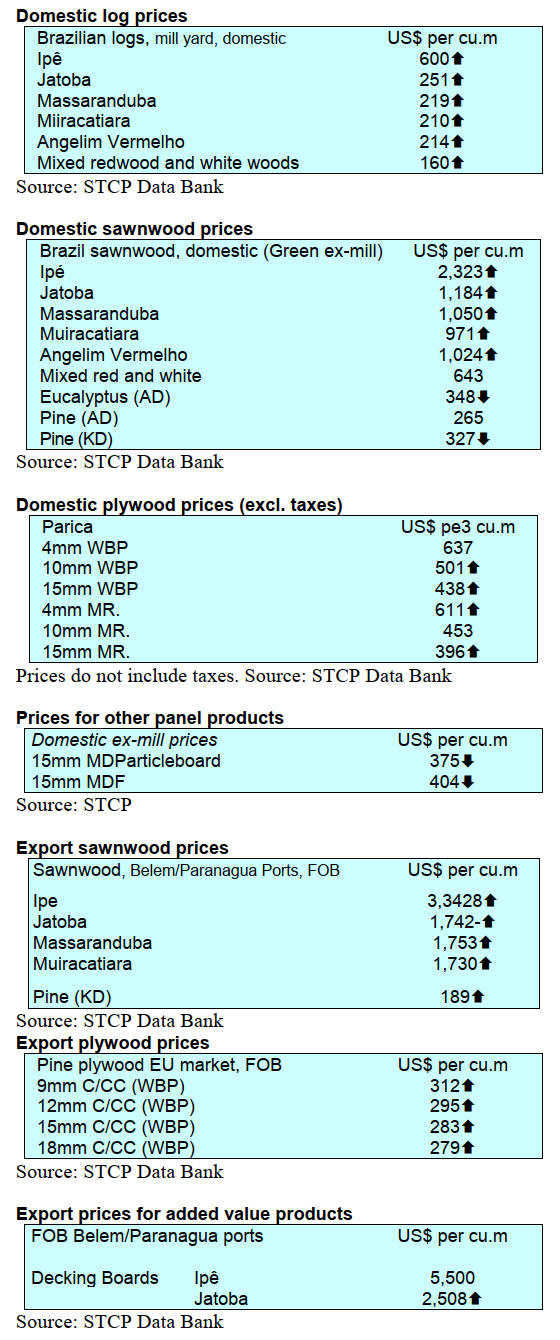
Through the eyes of industry
The latest GTI report lists the challenges identified by the private
sector in Brazil.
https://www.itto-ggsc.org/static/upload/file/20231121/1700552181514582.pdf
9. PERU
SERFOR approves granting
of benefits for good
forestry practices
The National Forestry and Wildlife Service (SERFOR)
approved the criteria and procedures for the evaluation and
granting of incentives and/or benefits for voluntary
forestry certification and for carrying out other good
forestry practices that will favor the competitiveness of the
sector.
With these guidelines SERFOR seeks to promote the
adoption of good practices by forestry and wildlife
companies and producers that contribute to the
sustainability of forestry and wildlife management as well
as competitiveness and social inclusion.
In Peru there are 9.3 million hectares of natural forests
under forest management of which 1.38 million hectares
have forest certification to international standard, over 80
initiatives under 40 FSC certificates at different points in
the wood supply chain and 1.9 million hectares with
carbon certification among other types of certificates.
SERFOR seeks to reward these initiatives and encourage
other holders of forest titles which include permits granted
to native and peasant communities.
See:
https://www.gob.pe/institucion/serfor/normas-legales/4810954-d000244-2023-midagri-serfor-de
Proposals to improve and promote forest
plantations
Within the framework of the National Forestry Week and
the Sustainable Productive Forests (BPS) programme,
representatives of SERFOR were present at two events
held in Cajamarca and Lima through the participation of
the management of the Forestry Project ‘Investment in
Commercial Forest Plantations’.
A presentation was given on the scope of the project in
seven regions in the country.
The School of Forest Engineering at the National
University of Cajamarca organised a forum ‘Forest
plantations in Cajamarca, perspectives in a climate change
scenario’ an event that brought together leading experts
from the university, the state and civil society to discuss
solutions to strengthen the department in relation to
forestry investment.
This event was held at the facilities of the regional branch
of the College of Engineers of Peru. In addition, it was
promoted within the framework of the National Forest
Week 2023 in coordination with the National University
of Cajamarca, SERFOR and FONCREAGRO.
See:
https://www.gob.pe/institucion/serfor/noticias/866599-serfor-participo-en-eventos-sobre-propuestas-para-mejorar-e-impulsar-las-plantaciones-forestales
OSINFOR records promote competitiveness in the
forestry sector
During the first half of November the Forestry and
Wildlife Resources Supervision Agency (OSINFOR)
delivered Certificates of Compliance to 22 holders of
enabling titles in Ucayali. This document that recognises
good forestry practices and contributes to strengthening
the legality of forest products and their competitiveness in
national and international markets.
The head of OSINFOR, Lucetty Ullilen, said “we want to
give this recognition to those who are doing their job well
and who, in addition, serve as an incentive for discounts in
the payment of rights for forestry use”. She added that the
Compliance Certificates are part of OSINFOR's
promotional approach which seeks to encourage those who
are fulfilling their obligations in forest management.
See:
https://www.gob.pe/institucion/osinfor/noticias/861586-constancias-de-cumplimiento-del-osinfor-promueven-la-competitividad-del-sector-forestal
In related news, OSINFOR has developed and
successfully implemented optimised supervision which
uses a selective logging detection algorithm to improve
monitoring efficiency to ensure the sustainability of forests
and their services.
See: https://www.gob.pe/institucion/osinfor/noticias/862656-osinfor-optimiza-las-supervisionescon-tecnologia-de-vanguardia-e-innovacion-para-hacer-frente-a-la-tala-
illegal
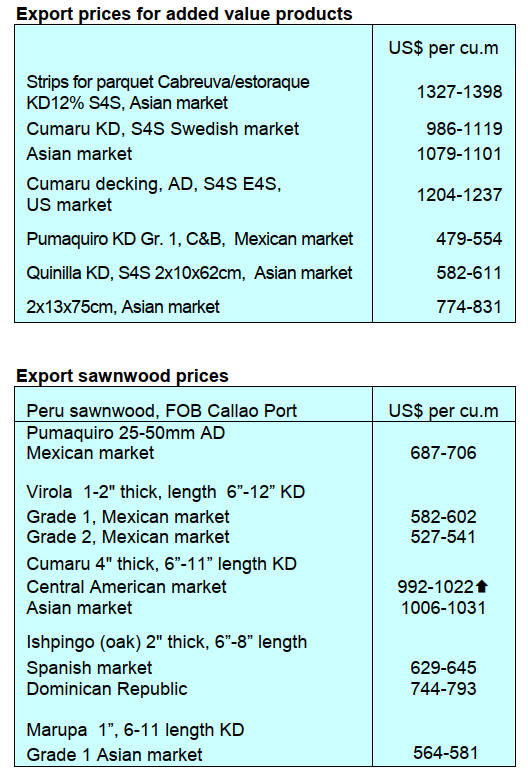
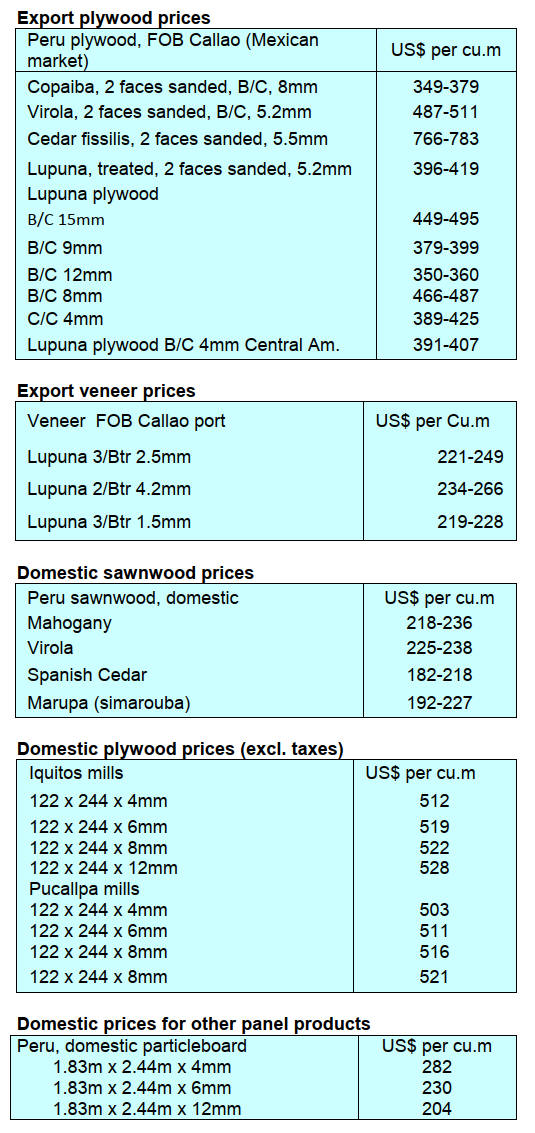
|